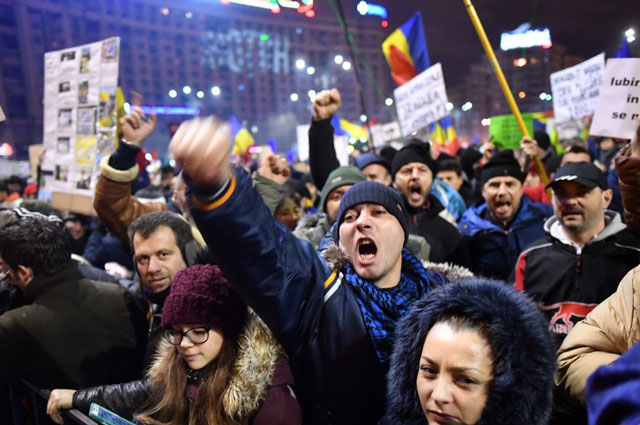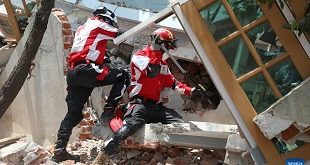
Bucharest, Romania | AFP |
Romania’s premier announced Saturday a dramatic climbdown on legislation that had been seen as a retreat on corruption, after the biggest protests since dictator Nicolae Ceausescu was toppled and executed in 1989.
Demonstrators vowed to keep up the pressure on the government, however, after five days of protests culminating in an estimated 330,000 people taking to the streets nationwide on Saturday.
Prime Minister Sorin Grindeanu said in a televised statement that the government would meet on Sunday to repeal an emergency decree that could have seen some corrupt officials escape prosecution.
“I do not want to divide Romania,” Grindeanu said at government headquarters in central Bucharest, sparking celebrations among the estimated 120,000 people protesting outside for a fifth evening in a row.
Raluca, a demonstrator in her 30s, said she was delighted but that the leftwing government, which has been in office for barely a month, was still not to be trusted.
“People are going to remain very vigilant with this government,” she told AFP.
The decree, passed Tuesday and due to enter into force on February 10, was to make abuse of power a crime only punishable by jail if the sums involved exceeded 200,000 lei (44,000 euros, $47,500).
The government also wants in a separate decree to be reviewed by parliament next week to free some 2,500 people from prison serving sentences of less than five years.
Grindeanu, from the left-wing Social Democrats (PSD), had said that the measures were to bring penal law into line with the constitution and reduce overcrowding in prisons.
Critics had said that the real aim was to let off some of the several thousand officials and politicians ensnared in a major anti-corruption drive in recent years, many of them from the PSD.
Earlier this week Brussels, which had previously praised Romania for its efforts, warned against “backtracking”.
Washington also said it was “deeply concerned” about “accountability” for corruption crimes.
– ‘We want justice’ –
But most worried of all were ordinary Romanians, who poured onto the streets in numbers not seen since people power toppled Ceausescu and consigned the communist system to history in 1989.
Saturday saw a noisy march in Bucharest by tens of thousands of people, holding banners, waving flags and blowing whistles and vuvuzela horns, to the parliament building where they formed a human chain.
Other protests took place in other cities around the country like Timisoara, cradle of the 1989 revolution, and in Cluj and Sibiu.
On Friday night there were between 200,000 and 250,000 people demonstrating around the country, and on Wednesday as many as 300,000 according to estimates by Romanian media.
“It’s about the future of our children, for our kids. We want justice to be made,” said Georgiana Dragoi, a housewife taking part in a protest of families with children on Saturday morning.
Civil servant Alexander, 30, pushing his baby in a pram in the Bucharest demo, said that he regularly experiences graft in his daily life.
Corruption “is all around us, small things that make our lives much more difficult,” he told AFP. “I work in the system and for a person inside it is terrifying.”
– ‘Only words’ –
Despite the celebrations at the government’s climbdown, Bucharest still echoed with the sounds of horns late into the night, as Romanians said they wanted to make sure the government lived up to its word.
“There is no substance here, there are only words. We have to see this put in practice,” said businesswoman Aura Oprea.
And unemployed demonstrator Abraham Mohammed, while saying he was “very happy that we solved this”, said the country still has a long way to go to root out corruption.
“There are so many thieves in this country. They want to steal our future. They want to steal our future, our kids’ future, everyone’s future and that is very bad,” he told AFP.
 The Independent Uganda: You get the Truth we Pay the Price
The Independent Uganda: You get the Truth we Pay the Price



